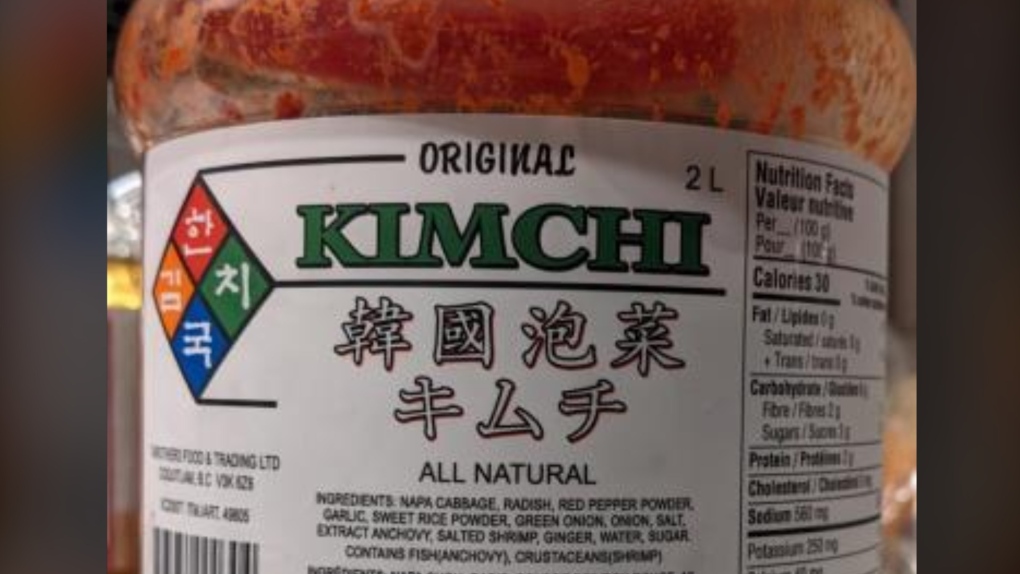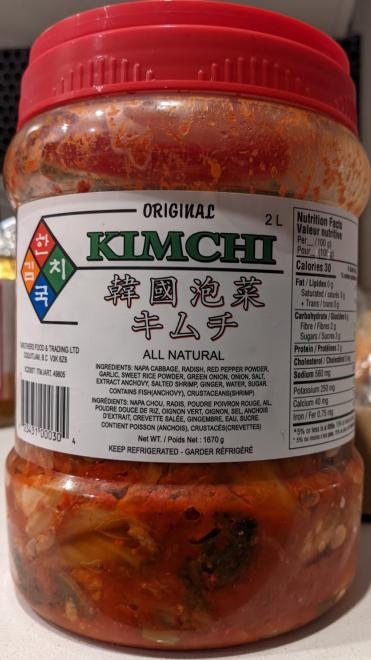Recall alert: Kimchi sold in B.C. may be contaminated with E. coli
 The label of Hankook-brand Original Kimchi is seen in a photo from CFIA.
The label of Hankook-brand Original Kimchi is seen in a photo from CFIA.
A product sold in British Columbia and three other Canadian provinces may be contaminated with E. coli, federal health officials warn.
A recall notice issued Friday asks consumers to check their homes for Hankook-brand Original Kimchi. The brand name is written in Korean characters only.
The 1,670-gram containers are sold in B.C., Alberta, Saskatchewan and Manitoba.
The recall concerns only products with the best before date of Jan. 29, 2022, and the UPC 6 23431 00030 4.
The food recall warning advises anyone who has the product to throw it out or return it to where it was purchased. Consumers will not necessarily be able to tell by look or smell whether their kimchi is contaminated, but they'll know if they get sick.
Symptoms include nausea, vomiting, abdominal cramps and "watery to bloody diarrhea," the recall notice says.
In extreme cases, however, those who've eaten a product contaminated with E. coli may have seizures or strokes, need a blood transfusion and kidney dialysis, or live with permanent kidney damage. Some cases have been fatal.
Anyone who thinks they've been sick from consuming a recalled product such as this is asked to report it to their doctor.
The recall followed an inspection by the Canadian Food Inspection Agency, which was looking into a foodborne illness outbreak, the notice said.
Further inspection is underway, and it's possible more products will be recalled.
Escherichia (E.) coli is one of several common causes of food poisoning in Canada. The bacteria can be spread through infected people and animals as well as contact with contaminated surfaces, foods and liquids, Health Canada says.
An infection can be diagnosed through lab testing, often with a stool sample, but there is no medical treatment for it. Complications associated with an infection may, however, require treatment, and those dealing with food poisoning should make efforts to avoid dehydration.
 (CFIA photo)
(CFIA photo)
CTVNews.ca Top Stories

Liberal MP says she's leaving politics over disrespectful dialogue, threats, misogyny
Liberal MP Pam Damoff says she won't run again in the next federal election, saying she has experienced misogyny, disrespectful dialogue in politics and threats to her life.
Concerns about Plexiglass prompt inspections at some Loblaws locations in Ottawa
Inspections are underway at more than one Loblaws location in Ottawa after complaints were filed about tall Plexiglass barriers.
Federal employees will be required to spend 3 days a week in the office
Starting in September, public servants in the core public administration will be required to work in the office a minimum of three days a week. The Treasury Board Secretariat says executives will need to be in the office four days per week.
OPP officer said 'someone's going to get hurt' before wrong-way Hwy. 401 crash
As multiple Durham police cruisers were chasing a robbery suspect on the wrong side of Highway 401 Monday night, an Ontario Provincial Police officer shared his concerns, telling a dispatcher, "Someone's going to get hurt."
Ont. woman who faked pregnancy to defraud doulas arrested again on similar charges
Victims of a Brantford, Ont., woman who was sentenced to house arrest earlier this year for defrauding and deceiving doulas say they’re not surprised she’s been apprehended again on similar charges.
Five human skeletons, missing hands and feet, found outside house of Nazi leader Hermann Göring
Archeologists have unearthed the skeletons of five people, missing their hands and feet, at a former Nazi military base in Poland.
Poilievre returns to House unrepentant for calling Trudeau 'wacko,' Speaker not resigning
An unrepentant Pierre Poilievre returned to the House of Commons on Wednesday to pepper the prime minister about his drug decriminalization policies after being booted the day prior for refusing to take back calling Justin Trudeau 'wacko' over his approach to the issue.
Police killed student outside Wisconsin school after reports of someone with a weapon, official says
Police shot and killed a Wisconsin student outside a middle school after receiving a report of someone with a weapon while class was in session Wednesday.
Highway collapse in southern China kills at least 36 people
A section of a highway collapsed after heavy rains in southern China, sending cars tumbling down a slope and leaving at least 36 people dead, authorities said Thursday.

































